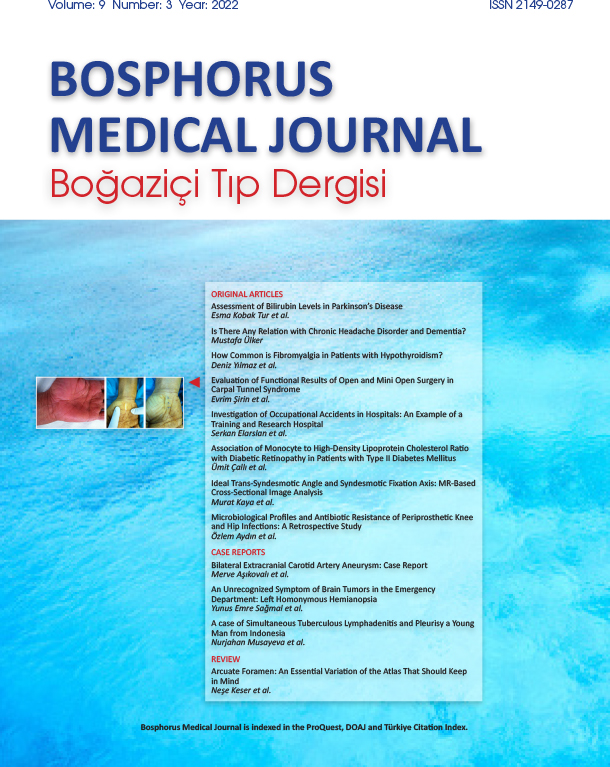Spondilartropatiler İrritabl Bağırsak Sendromunda Artışa Neden Olur Mu?
Sibel Süzen Özbayrak, Berna Günay, Nilgün Mesci, Duygu Geler KülcüSağlık Bilimleri Üniversitesi Haydarpaşa Numune Eğitim ve Araştırma Hastanesi, Fiziksel Tıp ve Rehabilitasyon Anabilim Dalı, İstanbul, TürkiyeGİRİŞ ve AMAÇ: Psoriatik Artrit (PsA) ve Ankilozan Spondilit (AS) hastalarında IBS ve gastrointestinal semptomların sıklığını belirlemek ve ayrıca yeme alışkanlıkları, uyku bozukluğu ve depresyonun gastrointestinal semptomlar üzerindeki etkilerini araştırmaktır.
YÖNTEM ve GEREÇLER: Çalışmaya AS ve PsA olguları ile bu hasta grubuna yaş ve cinsiyet olarak uyumlu kontrol grubu dahil edildi. Hastaların demografik bilgileri kaydedildi, hastalık aktiviteleri değerlendirildi. Tüm hastalara ROME III kriterleri ve İrritabl Bağırsak Sendromu Yaşam Kalitesi anketi kullanılarak IBS semptomları sorgulandı. Gastrointestinal Semptom Derecelendirme Ölçeği, Beck Depresyon Envanteri, Pittsburgh Uyku Kalitesi İndeksi ve Sağlıklı Beslenmeye Yönelik Tutum Ölçeği de kullanıldı.
BULGULAR: IBS sıklığı ve gastrointestinal semptomlar açısından gruplar arasında istatistiksel olarak anlamlı fark yoktu. Beck Depresyon Envanteri ve Sağlıklı Beslenmeye Yönelik Tutum Ölçeği açısından gruplar arasında istatistiksel olarak anlamlı bir fark yoktu. Grup analizlerinde, IBS ile gastrointestinal semptomlar ve depresyon, yeme alışkanlıkları veya uyku bozukluklarının varlığı arasında herhangi bir bağlantı bulunamadı.
TARTIŞMA ve SONUÇ: AS ve PsA'da IBS ve gastrointestinal semptomların sıklığında artış görülmedi. Ayrıca AS ve PsA hastalarında uyku bozukluğu, yeme alışkanlıkları ve depresyon skorları arasında korelasyon bulunamadı.
Does Spondylarthropathy Cause an Increase in Irritable Bowel Syndrome?
Sibel Süzen Özbayrak, Berna Günay, Nilgün Mesci, Duygu Geler KülcüDepartment of Physical Medicine and Rehabilitation, Health Sciences University Haydarpaşa Numune Training and Research Hospital, Istanbul, TürkiyeINTRODUCTION: The objectives were to determine the prevalence of IBS and gastrointestinal symptoms in people with psoriatic arthritis (PsA) and ankylosing spondylitis (AS), as well as to investigate the effects of eating habits, sleep disturbances, and depression on gastrointestinal symptoms.
METHODS: The study included AS and PsA cases and also an age- and gender-matched control group for comparison. Demographic information was recorded, and disease activity was evaluated. All patients were asked about their IBS symptoms using the ROME III criteria and the Irritable Bowel Syndrome Quality of Life questionnaire. The Gastrointestinal Symptom Rating Scale, Beck Depression Inventory, Pittsburgh Sleep Quality Index, and Attitude Scale for Healthy Nutrition were also used.
RESULTS: There was no statistically significant difference between the groups in terms of the frequency of IBS and gastrointestinal symptoms. Regarding the Beck Depression Inventory and the Attitude Scale for Healthy Nutrition, there was no statistically significant difference between the groups. In group analyses, there was no connection between IBS and gastrointestinal symptoms and the existence of depression, eating habits, or sleep disturbances.
DISCUSSION AND CONCLUSION: There was no increase in the frequency of IBS and gastrointestinal symptoms in AS and PsA. Additionally, we found no correlation between sleep disturbances, eating habits, and depression scores in AS and PsA patients.
Makale Dili: İngilizce




















